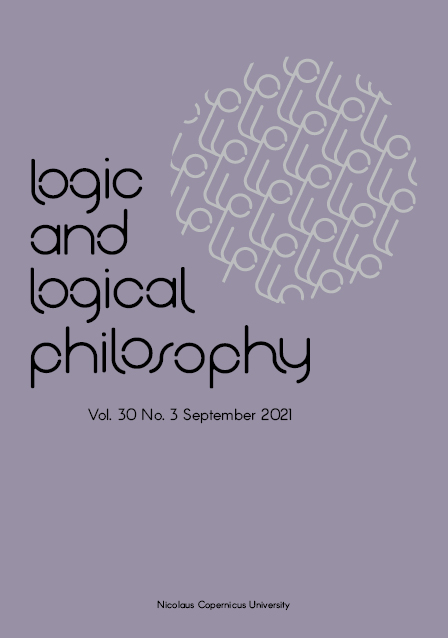Peirce’s Triadic Logic and Its (Overlooked) Connexive Expansion
DOI:
https://doi.org/10.12775/LLP.2021.007Keywords
Peirce, Triadic Logic, conjunction, disjunction, connexive logic, natural deduction, generalized truth valuesAbstract
In this paper, we present two variants of Peirce’s Triadic Logic within a language containing only conjunction, disjunction, and negation. The peculiarity of our systems is that conjunction and disjunction are interpreted by means of Peirce’s mysterious binary operations Ψ and Φ from his ‘Logical Notebook’. We show that semantic conditions that can be extracted from the definitions of Ψ and Φ agree (in some sense) with the traditional view on the semantic conditions of conjunction and disjunction. Thus, we support the conjecture that Peirce’s special interest in these operations is due to the fact that he interpreted them as conjunction and disjunction, respectively. We also show that one of our systems may serve as a suitable base for an interesting implicative expansion, namely the connexive three-valued logic by Cooper. Sound and complete natural deduction calculi are presented for all systems examined in this paper.
References
Anderson, A. R., and N.D. Belnap, Entailment. The Logic of Relevance and Necessity, Vol. 1, Princeton, NJ: Princeton University Press, 1975.
Angell, R.B., “A propositional logic with subjunctive conditionals”, Journal of Symbolic Logic 27 (1962): 327–343.
Belikov, A., “On bivalent semantics an natural deduction for some infectious logics”, Logic Journal of the IGPL (2021), DOI: http://dx.doi.org/10.1093/jigpal/jzaa071
Belikov, A., Petrukhin, Y., “Exactly true and non-falsity logics meeting infectious ones”, Journal of Applied Non-Classical Logics (2020). DOI: http://dx.doi.org/10.1080/11663081.2020.1751573
Belnap, N.D., “Conditional assertion and restricted quantification”, Noûs 4 (1970): 1–12.
Cantwell, J., “The logic of conditional negation”, Notre Dame Journal of Formal Logic 49 (2008): 245–260.
Ciuni R., T.M. Ferguson, and D. Szmuc, “Relevant logics obeying component homogeneity”, Australasian Journal of Logic 15, 2 (2018): 301–361.
Cooper, W. A., “Formalization of the logic of ordinary conditionals”, Ph.D. Thesis, University of California, Berkeley 1964.
Cooper, W. “The Propositional Logic of Ordinary Discourse”, Inquiry 11 (1968): 295–320.
Ebbinghaus, H.D., “Über eine Prädikatenlogik mit partiell definierten Prädikaten und Funktionen”, Arch. Math. Logik Grundlagenforsch, 12 (1969): 39–53.
Fisch, M., and A. Turquette, “Peirce’s Triadic Logic”, Transactions of the Charles S. Peirce Society 2, 2 (1966): 71–85.
Finn, V.K., and R. Grigolia, “Nonsense logics and their algebraic properties”, Theoria 59 (1993): 207–273.
Lane, R., “Triadic logic”, in M. Bergman and J. Queiroz (eds.), The Commens Encyclopedia: The Digital Encyclopedia of Peirce Studies, New Edition, 2001. Pub. 140917-1304a. Retrieved from http://www.commens.org/encyclopedia/article/lane-robert-triadic-logic.
Łukasiewicz, J., “O logice trójwartościowej”, Ruch Filozoficny, 5 (1920): 170–171.
Łukasiewicz, J., Selected Works, L. Borkowski (ed.), Amsterdam, Warsaw: North-Holland, PWN, 1970.
Ma, M., and A. Pietarinen, “Peirce’s calculi for classical propositional logic”, The Review of Symbolic Logic 13, 3 (2020): 509–540.
McCall, S., “Connexive implication”, Journal of Symbolic Logic 31 (1966): 415–433.
Odland, Brent C., “Peirce’s Triadic Logic: continuity, modality, and L” (unpublished master’s thesis), University of Calgary, AB, 2020.
Olkhovikov, G.K., “On a new three-valued paraconsistent logic”, pages 96–113 in Logic of Law and Tolerance, Yekaterinburg: Ural State University Press, 2002.
Olkhovikov, G.K., “On a new three-valued paraconsistent logic”, IfCoLog Journal of Logics and their Applications 3 (2016): 317–334.
Omori, H., “From paraconsistent logic to dialetheic logic”, pages 111–134 in H. Andreas and P. Verdée (eds.), Logical Studies of Paraconsistent Reasoning in Science and Mathematics, Berlin: Springer, 2016.
Omori, H., and D. Szmuc, “Conjunction and disjunction in infectious logics”, pages 268–283 in A. Baltag, J. Seligman and T. Yamada (eds.), Logic, Rationality, and Interaction: 6th International Workshop (LORI2017), Berlin: Springer, 2017.
Omori, H., and H. Wansing, “Connexive logics. An overview and current trends”, Logic and Logical Philosophy 28, 3 (2019): 371–387. DOI: http://dx.doi.org/10.12775/LLP.2019.026
Parks, R., “The mystery of Phi and Psi”, Transactions of the Charles S. Peirce Society 7 (1971): 176–177.
Petrukhin, Y.I., “The natural deduction systems for the three-valued non-sense logics Z and E”, Moscow University Mathematics Bulletin 73, 1 (2018): 30–33.
Priest, G., “Paraconsistent logic”, pages 287–393 in Handbook of Philosophical Logic, Dordrecht: Springer, 2002.
Sobocinski, B., “Axiomatization of a partial system of three-value calculus of propositions”, Journal of Computing Systems 1 (1952): 23–55.
Szmuc, D.E., “Defining LFIs and LFUs in extensions of infectious logics”, Journal of Applied Non-Classical Logics 26, 4 (2016): 286–314.
Szmuc, D.E., “An epistemic interpretation of paraconsistent weak Kleene logic”, Logic and Logical Philosophy, 28, 2 (2019): 277–330. DOI: http://dx.doi.org/10.12775/LLP.2019.014
Szmuc, D., and H. Omori, “A note on Goddard and Routley’s significance logic”, Australasian Journal of Logic 15, 2 (2018): 431–448.
Turquette, A., “Peirce’s Phi and Psi operators for Triadic Logic”, Transactions of the Charles S. Peirce Society 3, 2 (1967): 66–73.
Turquette, A., “Peirce’s complete systems of Triadic Logic”, Transactions of the Charles S. Peirce Society 5, 4 (1969): 199–210.
Wansing, H., “Connexive logic”, The Stanford Encyclopedia of Philosophy, Spring 2020 Edition, E.N. Zalta (ed.), https://plato.stanford.edu/archives/spr2020/entries/logic-connexive/.
Wansing, H., “Connexive modal logic”, pages 367–383 in R. Schmidt et al. (eds.), Advances in Modal Logic, Volume 5, London: King’s College Publications, 2006.
Wansing, H., H. Omori, and T.M. Ferguson, “The tenacity of connexive logic: Preface to the special issue”, IfCoLog Journal of Logics and their Applications 3 (2016): 279–296.
Downloads
Published
How to Cite
Issue
Section
Stats
Number of views and downloads: 1442
Number of citations: 0







